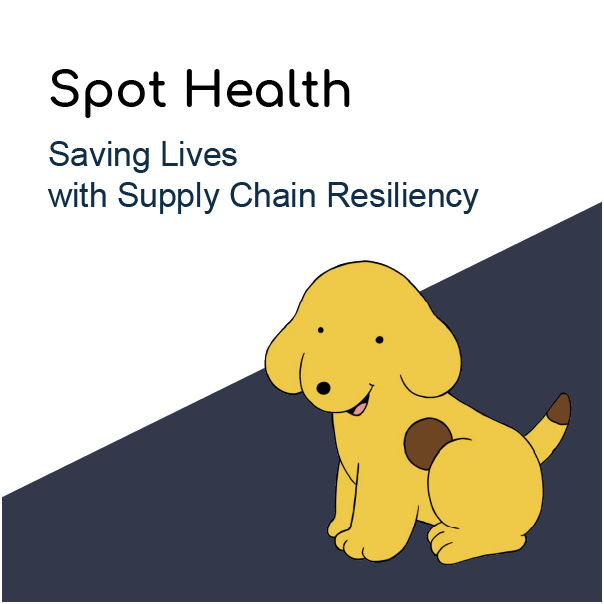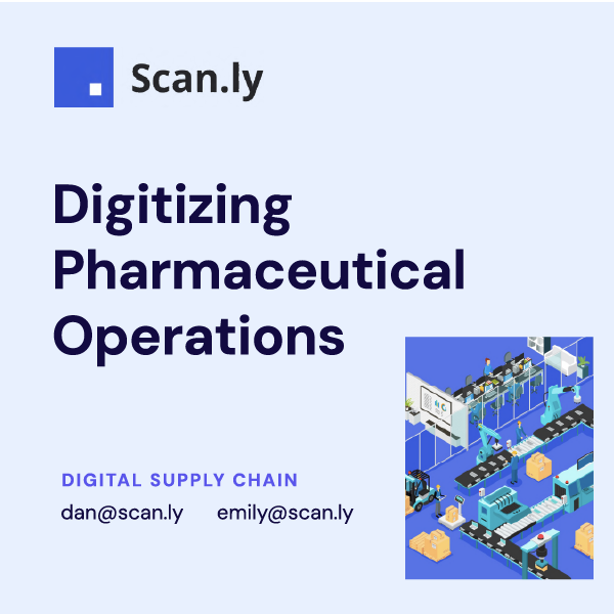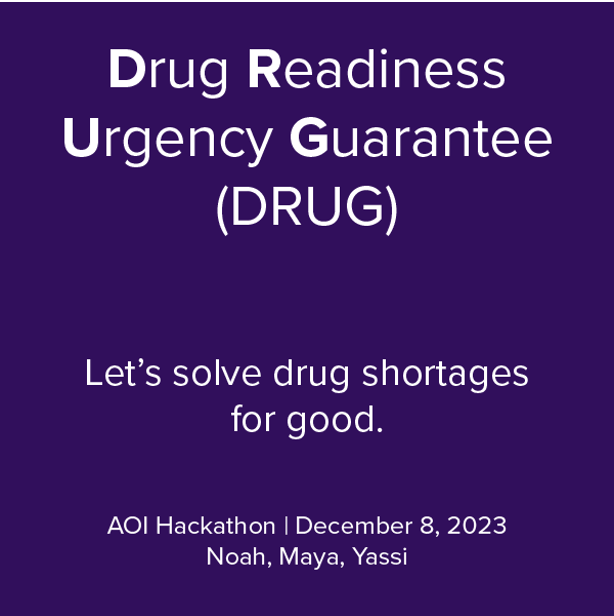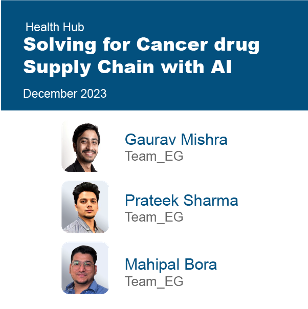AISCO Cancer Drug Shortage Hackathon
“The drug shortages are an enormous, complex problem and in part reflect an economic challenge, where essentially the low profit margin for some of these generic drugs disincentivizes companies from committing to producing them... People’s lives are really at stake here, both in terms of quality of life and duration of life.”
Dr. Philip Greenberg, President of the American Association for Cancer Research
Projects
The Spot Health team who proposed a live person-to-person marketplace for matching local surpluses in the supply of cancer drugs with cancer patients impacted by the shortage. Spot Health’s technical approach was compared with a “down detector” map view showing surpluses and shortages and noted that the overall description of the "shortage" often masked the existence of local surpluses that could provide patients in need with the remedy of an urgent supply.
The Procuro AI team who demonstrated an innovative Large Language Model to address various issues in contract structuring between group purchasing organizations, healthcare providers, and drug manufacturers, such as exclusivity clauses and competitor pricing penalties. Procuro AI's bespoke LLM demonstrated the capability to review large sets of purchasing contracts to help identify clauses that could lead to drug supply shortages and single points of failure.
The Scan.ly team who demonstrated an AI solution to configure a live event stream for cancer drugs traveling through the pharmaceutical supply chain, enabling supply chain and procurement teams to rapidly identify bottlenecks, delays or quality issues and pinpointing them to specific points of failure with rapidity and precision.
The Drug Readiness Urgency Guarantee proposal focuses on the problem that low margins in generic drugs lead to a weak supply chain, since there is very little financial incentive in this market. This team proposed a phased approach to 1.) create incentive to stockpile at risk generics. 2.) develop new industrial policy to create a nearshored, flexible generics manufacturing program and 3.) instrument, predict and reduce the demand shortfalls of generic drugs. This team’s focus on multiple phases in the timeline showed expansive thinking on the topic.
The SECURE cancer drugs proposal provided an outline for a new G7 initiative. This proposal is based on the pattern of the G7 in intervening with supply chain issues during both the COVID-19 and AIDS pandemics, and especially the widely recognized effectiveness of PEPFAR initiative to combat the spread of AIDS in Africa. These programs provide a strong precedent for the positive impact on supply chain problems. The solution would combine supply chain transparency data with AI to forecast future shortages and address problems before they emerge.
Team NodeData presented their GPT4V for BOL extraction proposal focused on gathering data from bills of lading (BOLs), which provide data on many shipments of goods. BOLs can provide shipper names, which generate valuable information for supply chain managers. By creating a system for tracking BOL data which may provide additional information that would allow the supply chain industry to gather data in advance of the Drug Shortage Prevention Act. The team proposes a machine learning model that is capable of extracting data from BOLs in order to provide better data for the drug manufacturers and consumers within the supply chain. This is necessary because BOLs are not standardized among shippers, so an ML model that is capable of drawing data consistently across many different BOL formats will be valuable for the industry at large.
The Health Hub team took the approach of leveraging AI to address the manufacturing incentives problem in the cancer drug supply chain. This proposal is based upon precedent in India (where much of the generic cancer drug supply is generated) of creating fixed prices for essential goods such as wheat and rice. The team created a process map of the cancer drug supply chain from first mile, middle mile and last mile delivery. The team proposed implementing a control tower and data layer to track and predict shortages and develop new production strategies at the high level. One key strength of this proposal was its focus on the international component of cancer drug supply.
The QPrime Team presented a multi-agent AI solution to streamline an internal surplus on the supply-side of the cancer drug supply chain. Having generated a global map of the supply and demand side of the global marketplace for cancer drugs. Providing a detailed entity relationship diagram of the platform, the team showed how it would generate operational decisions, strategic plans, compliance reports and suggestions for supplier improvement. An ambitious project, the platform would be able to simulate inventory changes across multiple timelines and provide a heatmap of low-supply events, which would provide supply chain managers with valuable predictions of supply chain shortages.
The SIGNALS team focused on the idea of predicting and surfacing supply chain shortages through data modeling practices. Their approach is to foreground impending cancer drug shortages by generating simulations from advanced probabilistic models. By interpreting signals for demand and disruptions in the supply chain, this project would identify potential shortages and then provide these data insights in order to influence policy.








